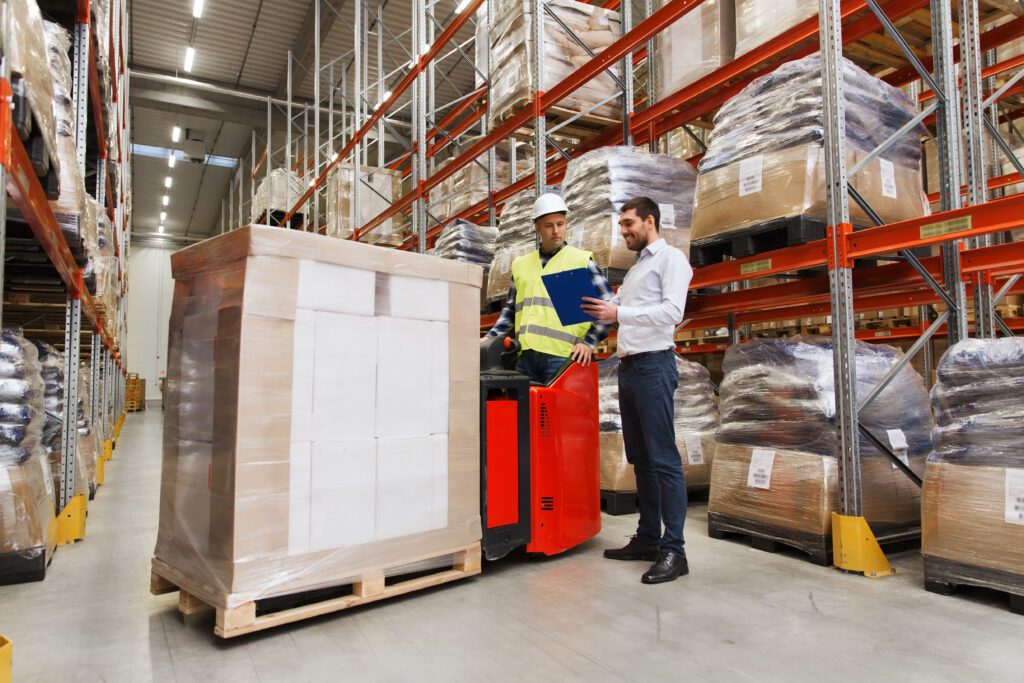Overview
About the course
Warehouse Operatives work in a variety of warehouse environments. Work activities include taking deliveries, checking for damaged/missing items, storing goods, moving stock by various methods, picking/packing orders, loading goods for dispatch, maintaining stock records and documentation, and cleaning. They are required to safely use a range of equipment, machinery and vehicles, as relevant to their role and setting. This could include mechanical racking systems, materials handling equipment (MHE) or fork lift trucks.
Warehouse Operatives communicate with a wide range of people and customers. They have a passion to meet customers’ expectations by providing a quality service that encourages repeat business. Individuals in this role are highly competent in using industry-recognised systems and associated services (e.g. Traffic/Warehouse Management Systems) and will be able to work under pressure to tight deadlines. A Warehouse Operative will often be required to be flexible and work shifts including 4-on-4-off, days, nights, evenings and weekends.
Contact Us
If you have any questions about this course then please contact us by phone on 01252 40 55 55 or message us.
Your course
What modules are covered?
The apprenticeship program consists of the following 4 components, leading to a Level 2 Supply Chain Warehouse Operative:
1. Knowledge and understanding of:-
- Safe driving and/or operating techniques to standard and as trained, relating to MHE (e.g. Counterbalance/Reach Trucks, Powered Pallet Trucks, Ride on Pallet Trucks, Order Pickers, Narrow Aisle Pickers, Mobile Elevated Work Platforms, Forklift Trucks) as relevant to their role and setting; adherence to safe practice when working at heights.
- Steps to take to minimise the effect their work (and the wider industry) has on the environment; the need to maintain a high level of housekeeping and manage waste effectively; using packing materials efficiently to reduce waste and costs; the consequences of not using or disposing of these correctly.
- Safe use of equipment and machinery (such as MHE, vehicle and delivery systems); where to find instructions/guidance; consequences of incorrect use.
- Use of warehouse systems and processes relating to packaging, moving and receiving stock (e.g. Load Container Lists) within a warehouse environment to facilitate the safe handling of goods and an effective and efficient service to internal/external customers.
- Basic IT applications and other relevant technology and systems, including warehousing management, data capture, radio and barcoding systems to ensure the safe and efficient processing of goods.
- Relevant regulation and legislation (including international where relevant to role) governing the supply chain industry, their subsector and role in particular; consequences of not adhering to legal guidelines.
- Effective communication with customers that store goods with the company/colleagues (including those working remotely, third party carriers, agencies and other organisations) in line with situation and organisational style/culture.
- Structure of the industry; methods and modes of transport; roles available within the sector in general and in relation to their own career aspirations.
- The importance of delivering excellent customer service to customers and colleagues, including identifying needs and responding appropriately in line with situation and organisational style/culture.
- Vision, objectives and brand of the organisation; the importance of organisation reputation and what can affect it; how their own performance can contribute to organisational success and support or impact on others.
- Proposed and actual changes to systems, processes and technology used in the industry, particularly relating to own role; how to keep up to date with any changes in the systems, processes and technology that affect their role.
- How their role can affect their health and the need to maintain a level of fitness appropriate to the needs of their role.
2. The competency to achieve the following in the workplace:-
- Operate and handle equipment safely and efficiently as required for their role, such as Forklift Trucks, High Reach Trucks, Powered Pallet Trucks or Man Up Trucks; manoeuvre vehicles in restricted spaces; safely use and position vehicle fitted equipment such as mirror requirements.
- Comply with appropriate rules, regulations and processes for safely and efficiently moving, handling, packing and unpacking different items, both manually and using relevant equipment (such as MHE, vehicle and delivery systems); understand consequences of incorrect use.
- Work individually and as part of a team to safely move and handle objects; maintain a high level of housekeeping and manage waste effectively; know where to find instructions or guidance; check for damaged or missing items as appropriate; take responsibility for maintaining health, safety and security of people at all times.
- Safely and efficiently load and unload items into and from vehicles, buildings, containers, lift vans, crates and/or boxes; use appropriate MHE or machinery where necessary; ensure items are safely and efficiently packed, assembled and/or disassembled as appropriate.
- Select, prepare and use packaging materials appropriate to the job efficiently and in a way which reduces waste, costs and environmental impact; taking into consideration the item(s) to be moved, and their current and final destinations.
- Use correct equipment and procedures to record receiving or stowing goods; produce relevant paperwork or labelling processes.
- Promote the values of the organisation; communicate effectively with customers and colleagues to identify and meet their needs.
- Work effectively in a warehousing team, including when under pressure, and to agreed deadlines; adapt to change in line with internal and external customer needs or circumstances.
- Use IT applications and other relevant technology and systems, including warehousing management, data capture, radio and barcoding systems, to ensure the safe and efficient processing of goods.
3. The soft skills and behaviours to achieve the following in the workplace:-
- Demonstrate integrity, credibility, honesty, positivity and personal drive in every aspect of their role; demonstrate a belief in the services that the organisation offers.
- Take ownership for own performance and training, including demonstrating a keen interest in the industry; proactively drive own ongoing learning and development, and make recommendations for improvement where relevant.
- Show personal commitment to minimising the effect of work activities on the environment.
- Adapt to and embrace the use of relevant technology, systems and equipment; use it responsibly and take an interest in new developments that could support the organisation.
4. Functional Skills: English & Maths (if required)
5. End Point Assessment
End point assessment is the final stage of your apprenticeship and you must pass this to achieve your apprenticeship. It is the chance to show the skills, knowledge and behaviours you have gained throughout your apprenticeship.
To find out more about the new standard, click here.
What training will be provided?
The training is delivered and assessed whilst attending Farnborough College of Technology once a week to learn the underpinning knowledge and develop skills in practical workshops. Apprentices are also supported in the workplace with regular progress and reviews.
Your future
What Next?
To view our Career Map for this course, please click here.
Apprenticeships are a proven way of increasing staff retention and productivity. 92% of employers who employ apprentices believe that Apprenticeships lead to a more motivated and satisfied workforce. Apprenticeships enable employers to recruit and train the employees to meet the specific needs of their business.
Completing this apprenticeship can give you the opportunity to progress onto the Transport and Warehouse Operations Supervisor Level 3 Apprenticeship Standard.
For more information or to recruit an Apprentice, please contact our Employer Hotline on 01252 407299 or email business@farn-ct.ac.uk
Entry Requirements
What previous qualifications and experience will I need?
The training programme is intended for new or existing staff working in a warehousing environment.
The entry criteria are staff aged 16 and over with a minimum of 5 GCSEs A*- D or 9 - 3 to include Maths and English. GCSE’s will be considered along with the results of an initial assessment.
Apprentices without Level 1 English and maths (Grade D / Grade 3) will need to achieve this level and take the test for level 2 prior to taking their apprenticeship end-point assessment. For those with an education, health and care plan or legacy statement, the English and maths minimum requirement is Entry Level 3 and British Sign Language qualification are an alternative to English qualifications for whom this is their primary language.
Ask a Question
Course Enquiry
Please contact us through the form below. After submitting a form we will contact you as soon as possible. We will delete your information one month after the beginning of the next academic year.
Apply
Apply
You can apply for this course online.







